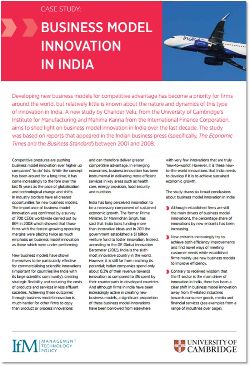Further research projects
Business Model Innovation for Digital Technologies: Unpacking the Productivity Paradox
Productivity growth has been slowing down in the last decade in major economies as well as in emerging markets despite the prevalence of digital technologies. This phenomenon is widely known as the productivity paradox. The productivity growth slowdown is particularly acute in the UK compared to other major economies. One of the main reasons for this productivity slowdown could be due to the limited redesign of business models following the adoption of new digital technologies by firms.
Business Model Innovation Research Group is investigating the implications of business model innovation on productivity resulting from the adoption of digital technologies. The research includes empirical analysis of various industry value chains, developing frameworks to measure business model effectiveness as part of the senior management decision support system and productivity reporting at a national level.
Business Model Innovation in Digital Fabrication
![]() This research is based on an EPSRC and ESRC grant on digital fabrication (also known as additive manufacturing or 3D printing). The study examines emerging business models as a result of technologies related to digital fabrication. The research team examines both cognitive and economic aspects of business models. The research team also studies business model transition challenges for incumbent firms. This study is done collaboratively with the Centre for Technology Management and the Inkjet Research Centre.
This research is based on an EPSRC and ESRC grant on digital fabrication (also known as additive manufacturing or 3D printing). The study examines emerging business models as a result of technologies related to digital fabrication. The research team examines both cognitive and economic aspects of business models. The research team also studies business model transition challenges for incumbent firms. This study is done collaboratively with the Centre for Technology Management and the Inkjet Research Centre.
Business Model Innovation and Entrepreneurship
This research examines how the degree of technology dependence of business models of start-up firms influences the survival of these firms. In addition, the study examines how the innovative nature of incumbent firms influences entrepreneurial spawning.
Business Model Innovation and Business Ecosystems
This research stream studies firms transforming from a relatively closed innovation to a more collaborative innovation business model with an ecosystem of firms. One study examines what type of governance system would be necessary for the firm to be more responsive in identifying and responding to intelligence by working collectively with the ecosystem partners. The second study examines the difference between manufacturing and service firms in their approach to searching for new ideas in the market place. A third study examines the transformation challenges of firms moving to a service-based business model with an ecosystem of firms – project within the Cambridge Service Alliance.
 Business Model Innovation and Economic Development
Business Model Innovation and Economic Development
One of the major themes under this research stream is examining the role of business models and technology for economic development, see Business Model Innovation in India feature. This is particularly of concern for countries that have experienced some economic development and looking to accelerate growth to catch up with more advanced economies. The research group is part of the Malaysia-UK Innovation Alliance (which was set-up by the Innovation Agency of Malaysia (AIM) under the Prime Minister’s Office in Malaysia) and seeks to support the exchange of knowledge and intellectual property between Malaysia and the UK through the application of science, technology and innovation. A number of scholarships for students pursuing PhD studies to examine these issues have already been set-up with further forthcoming collaborations. View details here.
The group ran two workshops on business model innovation:
- Business Model Innovation Workshop with Industry Leaders Workshop in July 2014
- Business Model Innovation Workshop with UK Academics in December 2014









